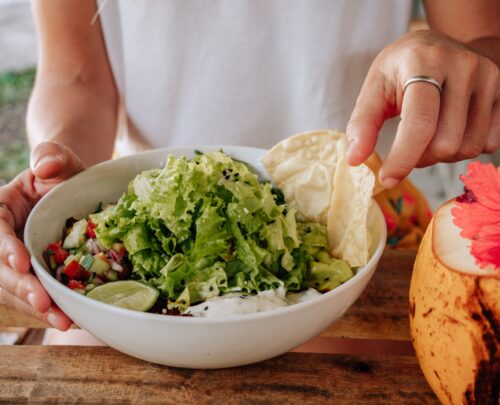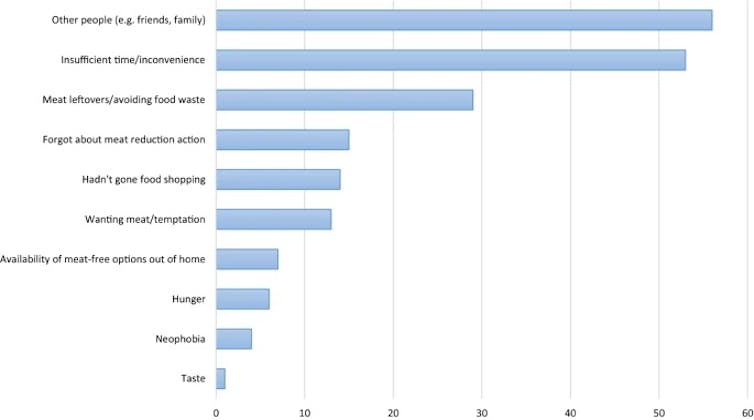
It’s Sunday and your family are sitting at the dinner table. There’s a bird roast, gravy and then there’s your vegan brother Tom. Your mum’s upset that he will not try a bit of the gravy on his vegetables and Grandpa is surprised that chicken even counts as meat.
We can be certain that the dinner conversation will soon circle around to how “normal, nice, necessary and natural” meat eating is. These are the four main rationalisation strategies that omnivores use to defend their dietary choices.
A vegan’s intentions are good. Most of them avoid using animal products because they don’t want to cause animals harm. But this can put your relationships under strain. When people first go vegan, “eating with others” is one of the main reasons it ends up not working out.
But a new type of meat-reducer is emerging: the “social omnivore”. This growing trend refers to people who will go for a kebab with their friends but will not eat meat when at home or on their own. It’s hard to say how common the phenomenon is, but the mantra is to avoid eating meat where you can and avoid social conflict when eating out.
Barriers to eating less meat:
 Self-reported barriers for not sticking to planned daily meat reduction actions.
Self-reported barriers for not sticking to planned daily meat reduction actions.
Frie et al (2022), CC BY-NC-ND
Why don’t you eat meat?
There are many reasons to avoid eating meat. No other food releases more greenhouse gases into the atmosphere or causes more habitat destruction than meat. Red meat in particular is also associated with an increased risk of heart disease, certain cancers and suffering a stroke.
Then there’s the uncomfortable truth that sentient animals have to die in order for us to eat meat.
What kind of meat-avoiding diet is right for you will depend on your underlying motivations. If you see meat as murder, then you will have to go all the way and follow a vegan diet. If you feel that consuming dairy is okay, becoming vegetarian may be a better option.
But if your dietary choices are driven by concerns for your health or the environment, an occasional meaty treat should not make you question your identity. Research from 2012 found that even by eating half as much meat and dairy, we could cut greenhouse gas emissions by 19% and prevent almost 37,000 deaths each year in the UK.
If this diet reflects you, then you join those who eat meat only occasionally – called “flexitarians”.
A social omnivore is a kind of flexitarian with a very clear rule about when they will eat meat: when it is served in a social setting. This can be much more effective than a general flexitarian intention to eat “less meat”. In this case, how much less meat or when to have it are decided on a moment-to-moment basis.
Clear rules
Research shows that a gap exists between our good intentions and behaviour. Whether it’s exercising more or eating fewer calories, we all tend to suffer from optimistic bias. This is the mistaken belief that we are closer to our goal than we really are.
If your intentions are not underpinned by clear rules, this gap can quickly become a gulf. We have to make many decisions about what to eat every day, and often under time pressure. If there are no clear rules to follow, we may fall into old habits rather than follow our good intentions.
Setting rules can help change behaviour because they reduce the cognitive load of multiple decisions every day. At the University of Oxford, we tested whether an online programme, called Optimise, could help prospective flexitarians reduce their meat consumption more effectively.
The programme involves completing a questionnaire to establish how much meat you currently eat before choosing from a range of different strategies each day for nine weeks to reduce your meat intake.
These might include suggestions like: “avoid the meat and fish aisle when shopping” or “go to a vegetarian or plant-based restaurant”. At the end of the programme, you will have a set of meat-reducing strategies, or rules, to put your low meat-eating intentions into practice.
In 2020, we trialled the programme on 151 meat eaters. After five weeks, the programme led to a 40g per day reduction in meat intake. This equates to between one and two fewer rashers of bacon each day.
Is it going to make a difference?
Given the largely linear association between meat intake and harm to health and the planet, any reduction in the amount of meat you consume is likely to be beneficial.
A report from the EAT-Lancet Commission on Food, Planet, Health (a global group of scientists who define targets for healthy diets and sustainable food production) suggests that a diet that is both healthy and sustainable should contain no more than 98g of red meat, 203g of poultry and 196g of fish per week. That’s plenty for an occasional feast with friends.
Big journeys begin with small steps. Becoming a social omnivore today will be better for your health and the environment than a plan to become a vegan tomorrow.![]()
This article is republished from The Conversation under a Creative Commons license. Read the original article.
For more advice on veganism and eating meat, we recommend:
Article sources and references
- Rationalizing meat consumption. The 4Nshttps://pubmed.ncbi.nlm.nih.gov/25865663/#:%7E:text=Recent%20theorizing%20suggests%20that%20the,their%20choice%20of%20eating%20meat.
- The relationship between meat disgust and meat avoidance—A chicken-and-egg problemhttps://www.frontiersin.org/articles/10.3389/fnut.2022.958248/full
- Multiple health and environmental impacts of foodshttps://www.pnas.org/doi/epdf/10.1073/pnas.1906908116
- The Optimise Programmehttps://optimisediet.org/
- Effectiveness of an Online Programme to Tackle Individual’s Meat Intake through SElf-regulation (OPTIMISE): A randomised controlled trialhttps://link.springer.com/article/10.1007/s00394-022-02828-9
- EAT-Lancet Commission Brief for Everyonehttps://eatforum.org/lancet-commission/eatinghealthyandsustainable/
www.healthyfood.com










